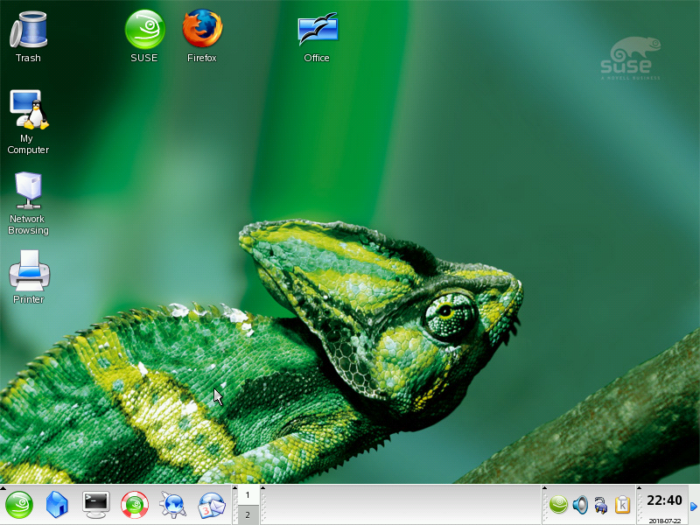Would openSUSE by any other name still have Tumbleweed and Leap? We’ve looked at the openSUSE name-change controversy and have decided there’s nothing to see here — move on.

You might have seen discussions about this on the internet already, that the big bad suits up in the C-suite at SUSE have laid down the law and demanded that the volunteers at the openSUSE Project need to remove the SUSE brand from their trademark and call the community distro open-anything-but-SUSE. If they don’t want to do that, they were allegedly told they might loose the considerable amount of support that the project has been receiving from SUSE.
That seems to have a lot of ordinary folks like you and me stomping their feet and muttering “how dare they” under their breath.
The trouble is, like a lot of things that are being discussed on the internet, the story isn’t true. This didn’t happen — at least not as it’s being told by some.
Also, like a lot of misinformation on the internet, it’s not completely made up. It’s a misunderstanding of an ongoing discussion that is happening in and around Luxembourg, which is where SUSE has been headquartered since April. The truth is, there have been discussions about dropping the syllable “SUSE” from openSUSE — or maybe a completely new renaming that drops the word “open” as well.
“This is something colleagues have proposed on behalf of SUSE, because they firmly believe it’s in the best interest of SUSE and openSUSE,” Gerald Pfeifer told me in an email on Friday. “This is the beginning of a conversation, not a mandate from the SUSE side.”

Pfeifer is CTO at SUSE. As it turns out, he’s also chair of the board at the openSUSE project, which means his involvement on this issue is from both sides of the aisle. I reached out to him because of an article on Linuxiac that contained some implications that SUSE was demanding that openSUSE remove “SUSE” from it’s name.
Turns out that isn’t true… at least, not exactly. There has been no corporate meeting on the subject of the openSUSE Project using “SUSE” in its name, and no decision made to send something akin to a cease and desist order along with a threat to disown the group if it doesn’t comply. Evidently, there’s no scorched Earth policy at SUSE.
“No big bad SUSE suits involved, no legal involved, no whatever involved,” Pfeifer said. “Simply experts contributing around branding, like other experts are contributing code or documentation.”
There were also no demands being made, or promises that heads would roll. What there was, was an ask.
“The word ‘ask’ in English seems to have various nuances – at least to this non-native speaker,” Pfeifer said. “If I could use some other words or phrases I might
use ‘suggestion’ or ‘recommendation’ or ‘food for thought’ or ‘polite/kind ask.”
This doesn’t mean that the ask was without weight, but it was more the “look at this and see what you can do” weight rather the heavy handed kind that comes with visions of discontinued funding or the like.
“It is official as far as SUSE goes since it comes from some who are working on branding and are quite knowledgeable around it, who had a look and are sharing their thoughts, and are suggesting some changes,” he said.
Oh, and it seems worthwhile to note that those doing the asking work both inside corporate SUSE and community openSUSE, and therefore they’re theoretically looking out for the interest of both.
“Many of us aren’t ‘just’ SUSE or ‘just’ openSUSE,” he explained. “Rather, many of us are SUSE employees, have open source in our hearts, and are openSUSE users and contributors. It’s an ‘and,’ not an ‘or.'”
So I asked, “You [meaning “SUSE”] still want to keep the same supportive relationship that you always have had, both in terms of helping keep the project funded and working with them [meaning “openSUSE”] on technical issues?”
“Yes, yes, and yes!” Pfeifer exclaimed.
Much Ado About Nothing?
Looking at the mailing list to which the Linuxiac article pointed, there was a little concern about the ask, with a few people worried that Goliath is threatening David, but mostly people seemed to understand how the marketing people and such at SUSE might want — need even — for openSUSE to drop their name to help do away with some confusion or something that’s hindering SUSE marketing efforts. I also saw consensus, both spoken and unspoken, that without a healthy SUSE there will be no openSUSE.
“Looking at the feedback on the discussions on the openSUSE side, there is more confusion and wondering by people not close to openSUSE or SUSE than I, for one, would have expected,” Pfeifer said. “Partly for that reason it seems the majority of openSUSE contributors who have spoken up so far appear quite open to a change of names.”
Of course, no matter what happens, there will be dissent. To paraphrase the words of an old US president: You can please all of the people some of the time and you can please some of the people all of the time…
“Of course, any such change will never make eveybody happy, and our goal absolutely needs to be to explain things as well as we can, make decisions participative and transparent, and any change as smooth as possible for contributors, and especially for users who may not be following such developments as intimately as our contributors.”
“Should this proceed, a cool new logo, a widely accepted name, and good – and loud – communications will be key,” he added.
I say drop Geeko the geko, but that’s just me.
Christine Hall has been a journalist since 1971. In 2001, she began writing a weekly consumer computer column and started covering Linux and FOSS in 2002 after making the switch to GNU/Linux. Follow her on Twitter: @BrideOfLinux










Certainly various name changes have not really hurt other community vs commercial systems. Fedora vs Red Hat. CentOS vs Red Hat. With decent marketing you can get the relationship across.
From a Trademark stance it might help protect the Trademark SUSE. That might differ from jurisdiction to jurisdiction. It might or might not make licensing clearer as a separation between the two products.
You can also change the name, but use a sub-title to bring the two together:
XXXXXXX:
The community distribution of SUSE.
Ugh why do this NOW?!?!
The “protect the” trademark argument is easily solved by Suse granting an exclusive license to the OpenSuse organization to use their trademark. This keeps anyone else from having a legal claim to it and allows OpenSuse to continue.